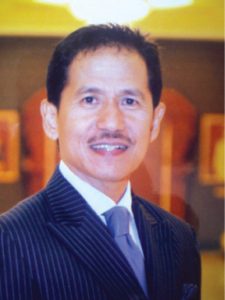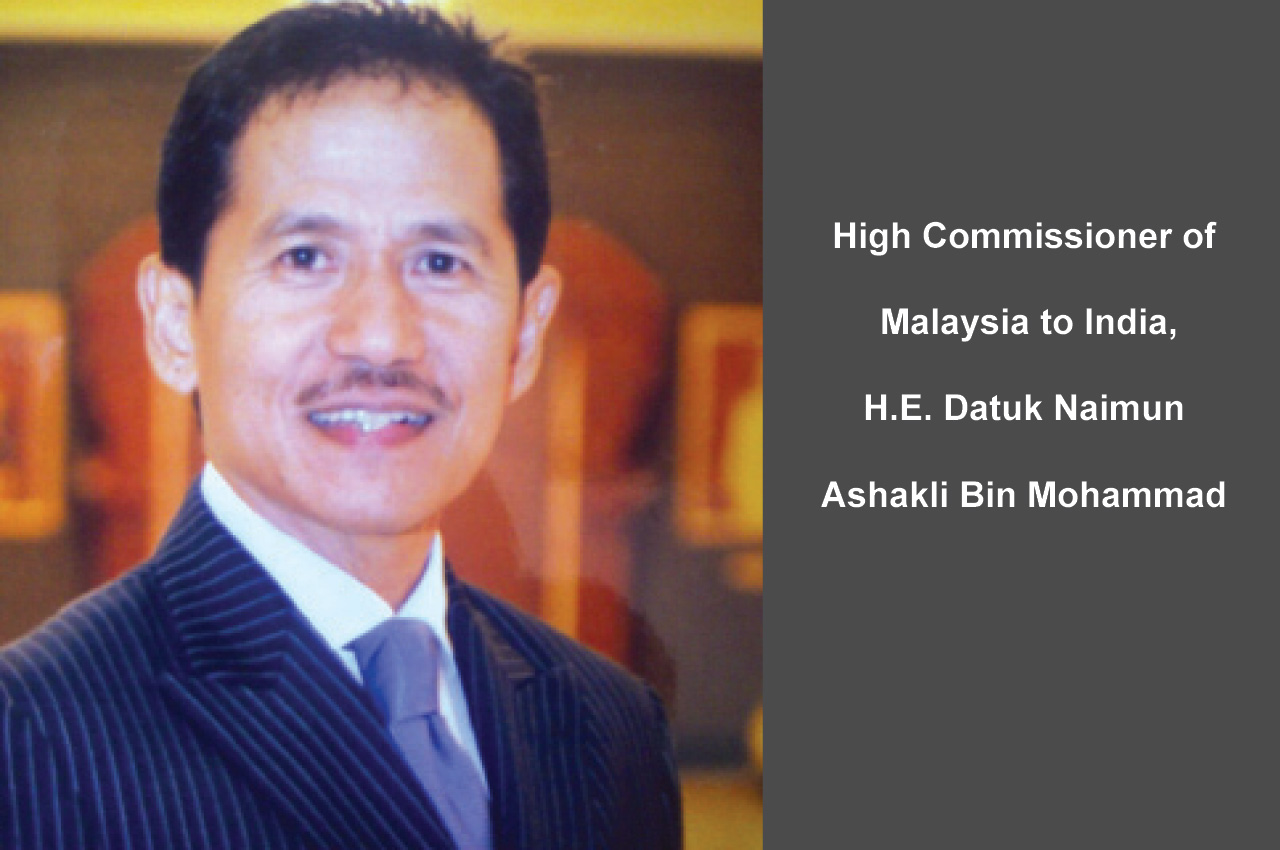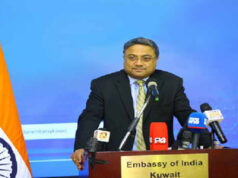 In an interview with Diplomacy & Beyond, High Commissioner of Malaysia to India, H.E. Datuk Naimun Ashakli Bin Mohammad, shares his vision on the issues related to furthering of relationship between the two nations in the fields of trade, investment, and foreign policy. He also elucidates the growing importance of developing strong cooperation between India and Malaysia. Here are the edited excerpts…
In an interview with Diplomacy & Beyond, High Commissioner of Malaysia to India, H.E. Datuk Naimun Ashakli Bin Mohammad, shares his vision on the issues related to furthering of relationship between the two nations in the fields of trade, investment, and foreign policy. He also elucidates the growing importance of developing strong cooperation between India and Malaysia. Here are the edited excerpts…
- Sir, describe your stay in India so far both in diplomatic and cultural terms?
My journey in India can be described as eventful and colourful. I have been here for almost three years now, and I have had the pleasure of meeting various personalities and visiting various cities and states of this incredible country. The various cultures I witnessed have captured my interest, and I hope I can visit a few more cities before I leave this country.
New Delhi has a healthy number of diplomatic representations; 156 foreign Missions and 29 international organizations. The diplomatic corp has always been a close-knit community, and it has been an honour to serve along with all of them. The Ministry of External Affairs India as well as other ministries and agencies have been very cooperative and accommodative in our bilateral engagements, and I hope that the close cooperation will continue in the future for our mutual benefits.
- Malaysia is India’s second most important trading partner amongst the ASEAN countries and also gateway to ASEAN and China. How do you plan to further strengthen bilateral trade and investment cooperation between both countries?
Both countries are looking to expand the trade and investment cooperation in a big way in the coming years. There are a number of comprehensive economic agreements that are being discussed between Kuala Lumpur and New Delhi, and I hope that it will be concluded soon. Malaysia’s Minister of International Trade and Industries, the Honourable Dato’ Seri Mustapa Mohamed undertook a Working Visit to India in May 2016 to explore new avenues for economic cooperation, especially in the infrastructure and services sector. Both countries have also set the target to achieve bilateral trade of USD 25 billion by the year 2020. Our Trade Office in New Delhi, Chennai and Mumbai are also working closely with the various stakeholders to aggressively promote bilateral economic ties in order to achieve the target.
- The people of two great nations share close religious and cultural affinity since ages. Don’t you think more efforts should be put in order to realise the true potential of tourism in both countries?
I believe we have done a lot to promote people-to-people relations between Malaysia and India. In 2015, Indian tourist’s arrival to Malaysia was more than 700,000 people, and our Tourism office has set a target to bring 1 million Indian tourists to Malaysia this year. We have also introduced the e-visa service to Indians who wish to visit Malaysia, where visas will be approved within 24 hours. (https://www.windowmalaysia.my/evisa/evisa.jsp). Apart from these, the recent re-entry by Air Asia into the Indian market brings the number of Malaysian airline companies operating in India to three (Malaysia Airlines Berhad and Malindo Air being the other two). I hope that all of these services and facilities will allow closer people-to-people relations within both countries within the coming years.
- The local Indian diaspora constitutes about 7 percent of Malaysians. Influential personalities of Indian origin in the country can be encouraged to play a more active role in strengthening the bilateral relations just as the US does. Your views?
The Indian diaspora in Malaysia has been an integral part of our nation since our independence in 1957. The community have been holding important and strategic posts, whether in the government or in the private sector, and they have contributed immensely to the growth and development of Malaysia.
In terms of the bilateral relations with India, the Government of Malaysia has appointed our former Minister of Works, the Honourable Dato’ Sri S. Samy Vellu as the Special Envoy to India and South Asia for Infrastructure since 2011. We have also had several High Commissioner in the past who were Indian. In any case, the close people-to-people relations among the two countries, given that most Indian diaspora in Malaysia originated from South India, has helped to flourish the relations that Malaysia and India enjoys to this very day. We believe that regardless of the ethnicity background, the positive spirit and goodwill will always be reflected in our relations.
- How do you rate the present Indian Government under Prime Minister Narendra Modi in terms of increasing proximity between two nations?
Prime Minister Narendra Modi had recently introduced the Act East Policy when he took over the central administration in 2014. Since then, we can see that Prime Minister Modi has increased his interactions with government leaders on this side of the world. As for Malaysia, we were honoured to receive him in November 2015 after a five-year hiatus since the last visit by an Indian Prime Minister back in October 2010. The visit had provided the stimulus that re-energised the relations between Malaysia and India. Since then, we have seen active interactions among the political masters, as evident by the visit of our Deputy Prime Minister and Minister of International Trade and Industries in July 2016 and May 2016 respectively.
Where does Malaysia stand on India’s aspiration for permanent membership of a reformed United Nations Security Council?
Malaysia takes note of India’s aspiration for permanent membership in the expanded UN Security Council. Malaysia reaffirms its position that the Security Council should be re-formed in a comprehensive manner, both in terms of its working methods and expansion of its membership, in order to make it more legitimate, representative, democratic, account-able and transparent.
- How does Malaysia plan to combat the increasing menace of global terrorism in cooperation with India?
Combating terrorism demands effective international action in accordance with the UN Charter and international law. Malaysia believes in a multifaceted approach in combating terrorism by addressing the root causes and underlying contributory factors that support terrorism. Winning the hearts and minds approach must be fully considered in our common endeavour to counter the terrorist threat.
Malaysia remains committed to tackle the threat of terrorism, including by strengthening its legal framework by updating and, where necessary, enacting new legislation. Malaysia believes that preventive measures are more effective to addressing the terrorism threat.
Malaysia and India has formed a Joint Working Group on Counter Terrorism and Transnational Crime in 2012 to discuss issues on domestic structures and policies in dealing with counter terrorism.
Malaysia believes that the practice of moderation should be embraced globally and calls for countries to censure and reject extremism and support moderation.
- How do you plan to promote Malaysia as a global level business destination in wake of forthcoming 60th Anniversary of Independence Day?
Malaysia has come a long way since its independence day. Malaysia has evolved significantly over the five decades. From agriculture and primary commodity-based economy to industrialization and today we are an economy driven by export. Our industry is fast changing from low value shifting up to towards the high value which is characterized with high technology, knowledge-based and capital intensive. We have shifted our focus in promoting Malaysia to international investors. In line with our pursuit to become a high-income nation by 2020, we recognise that investments which venture into resource extraction or are based on providing cheap labour are no longer in tandem with the shift needed in our economy. Instead, we are now targeting foreign investments that can add value, that are innovative, that use the latest technology and which are R&D based. Such investments can accelerate our efforts to move out of the middle-income trap and enable Malaysia to be-come an “Innovation Nation”.
For growth to continue, the economic reforms and structural changes are being implemented to further enhance Malaysia as an investment destination in an increasingly competitive global environment. The country will continue to align our investment promotion activities with the 11 Malaysia Plan to ensure a significant leap in investment activities that are crucial towards achieving a high-income economy. For the manufacturing sector, we are focusing on three catalytic subsectors namely chemicals, electrical and electronics (E&E) and machinery & equipment industries, and two subsectors of high potential growth namely aerospace and medical devices. As for the services sector, more attention will be given to ICT, oil & gas services, private healthcare, private higher education, tourism and professional services.
In promoting Malaysia as preferred trade and investment destination, we have to ensure the quality of our talent and workforce is of global standard. One of the important meas-ures to address this lies with the Talent Corporation which is established to source top tal-ent at home and abroad. The Government’s emphasis on human resource development ensures the continuous supply of manpower to meet the needs of the expanding manufac-turing and services sectors and investments.
Malaysia is also fully committed to the realization of the ASEAN Economic Community (AEC). As Malaysia is strategically located in the AEC market, we are well positioned to be the gateway to the ASEAN market. Collectively, ASEAN has over 600 million people, a potential market that is larger than the European Union or North America. The region is also one of the most open economic regions in the world, with total merchandise exports of over $1.2 trillion – nearly 54% of total ASEAN GDP and 7% of global exports.
Malaysia has progressively liberalized its economy over the last three decades. We have implemented many investor friendly policies. For instance, 100% foreign equity participa-tion in manufacturing is allowed. We have also made efforts to gradually liberalize our ser-vices sector. Malaysia is also pursuing regional and bilateral trading arrangements to com-plement the multilateral approach to trade liberalization. We have participated in 14 FTAs which have enforced so far. Free Trade Agreements (FTAs) are generally aimed at providing the means to achieve quicker and higher levels of liberalisation that would create effective market access between the participants of the FTA.
- What is your message for the readers of Diplomacy & Beyond (D&B) magazine in India and abroad?
Having a special feature in the magazine further contributes to the close nature of the relations between Malaysia and India, and I hope that the readers of this magazine would be able to appreciate what Malaysia has to offer not only to India, but also to the global community.









